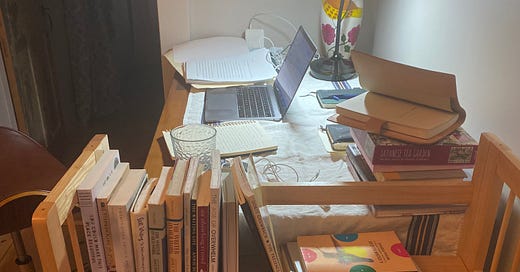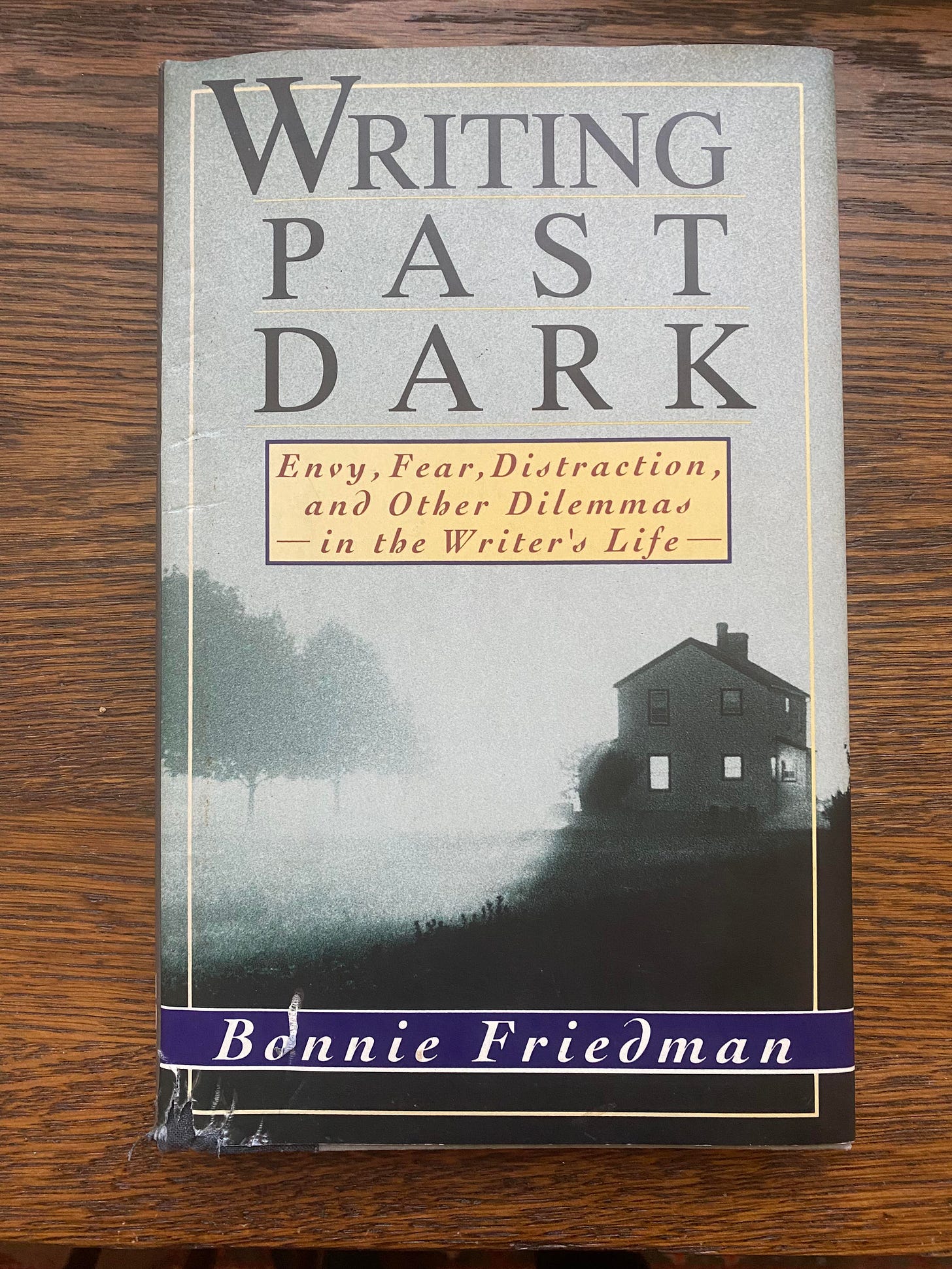Years ago, when I was living in Manhattan and working at HarperCollins, I was an editor on the paperback edition of one of the greatest books on the craft of writing that I think was ever written; I say this not because its author, Bonnie Friedman, became my friend (and for a long time, my mentor, along with the novelist Jenifer Levin), but because she spoke the unspeakable. In her book Writing Past Dark, she talked about the things that we all know to exist — they’re out there for every maker of art, every creative, even every business person — but dare not go near: issues of envy and fear in the creative’s life.
The editor who had acquired the hardcover — also now a dear friend, formerly my manager — once asked me when we were talking about Writing Past Dark whether or not I’d experienced these issues myself; my third memoir, Motherland, was just coming out, and I was facing the inevitable nerves, and the practical problems surrounding media and publication. (Could I drop, say, thirty pounds by pub date? Could I grow, say, six inches—vertically?) I told my friend what was happening — my book had been delivered early and another book on an almost identical subject was being published by another house, and their publisher was going to try and get their book out earlier, even just by a month or so, to get a jump on media.
For people who are not on the inside of the business, what this means is: if two similar books come out at the same time, media will usually only focus on one of them — there’s just so much time and media space allocated to each of the 750.9 million books sold, for example, in 2020 (I’m being sarcastic; most of those books won’t get a sliver of a sliver of media time) and generally the one with the more media savvy author wins. Connections help, a lot. Enigmatic beauty and mystery are also a very big plus. (I’m very sorry: I’d really like to say this is hyperbole, but alas: nope.) How it effects other authors — the ones who are called upon to support their colleagues’ new books with blurbs, panels, etc? Those authors often also have to choose: who will they throw their energies behind? Who will provide them with a silent little nudge of popularity-by-association? Someone I used to know, a new writer, was once outraged when I told them this fact, which was not meant as a dig or sour grapes; it’s just the truth. I’m one of those authors who has had the benefit of sitting on both sides of the table — I was an editor for the better part of two decades, with sixteen New York Times bestsellers to my name — and sadly, this is all fact. And when my own editors call to tell me that they decided to not be super-competitive with one of my titles, they almost always end the conversation with this line: You’re an editor….you know how this works.
SO: Getting back to the book — Writing Past Dark. My friend/former boss and I were talking about Bonnie’s book, and how she was speaking the unspeakable. How many of us buy a book and flip to the back flap to see the author photo? How many of us do this before we buy the book? How many people wince when a friend lands an essay in, say, The New Yorker, and takes just a split second too long to congratulate them? I once told a well-known writer that I’d just had an essay taken by a highly esteemed literary journal; I was thrilled, and grateful. She waited a beat, beamed, and said That’s where writers get published when they can’t get into The Paris Review. I realized that every single time something happened for me like this, their response was exactly the same. (Here’s a crumb; enjoy your supper.) This is scarcity mindset writ large: I have to take what is yours even if I myself don’t want it because less for you, more for me. (As my friend, the late writer David Rakoff would have said: You’re a writer? Don’t get too comfortable.)
This is scarcity mindset writ large: I have to take what is yours even if I myself don’t want it because less for you, more for me.
I told my former boss about this conversation about my essay, and how my friend had responded. You should see how the poets treat each other, she said, laughing. I did not find it funny.
Writers — creatives as a whole — spend hours, days, weeks, years at work, producing the art that they are called to by forces that are often elusive. Every creative has work that they are haunted by, that will not leave them alone, that screams in their ear while they’re walking the dog or standing in the shower. In my next book — the one I’m working on now — I spend a fair amount of time unpacking the fact of what it means to be haunted by work to the degree that one can’t shake it, against all odds, especially if they do not have permission — cultural, familial, psychological, societal — perceived or not, to write it.
Every creative has work that they are haunted by, that will not leave them alone, that screams in their ear while they’re walking the dog or standing in the shower.
After three memoirs and another book-in-progress as we speak, I still do it: late at night, when I can’t sleep, I skulk down the hallway and into my office and open up a desktop file containing a story that spilled out of me one night after work in 1996. That evening, I walked into my apartment, dropped my bag, fed my cats, and sat down at the computer without even taking my coat off. By midnight — I had forgotten to eat, although I’m certain I brought a bottle of wine over to my desk to grease the skids — I had written the first draft of a twenty page story about two mid-century suburban New York couples, close friends, each with a young child one of whom is paraplegic from birth, and how, in plain sight, one of the husbands — a teacher, a combat veteran — is sleeping with both his friend’s wife and his friend’s young daughter. On a long, middle of the night drive home to New York from Florida, one of the wives sets their car on fire, with them in it. We never know if it is intentional, or not. The late Sixties; people are dying; the world is burning; the world rolls forward; days pass; this is their normal. The story is about choosing not to look at what is right in front of you, and the devastation that follows.
The story: rejected everywhere. I have a folder-full of Thanks, not right for us, please send more. And yet: it haunts me. It won’t leave me alone. Will it ever see publication? No idea. But that’s actually not the point.
Keep reading with a 7-day free trial
Subscribe to Poor Man's Feast to keep reading this post and get 7 days of free access to the full post archives.






